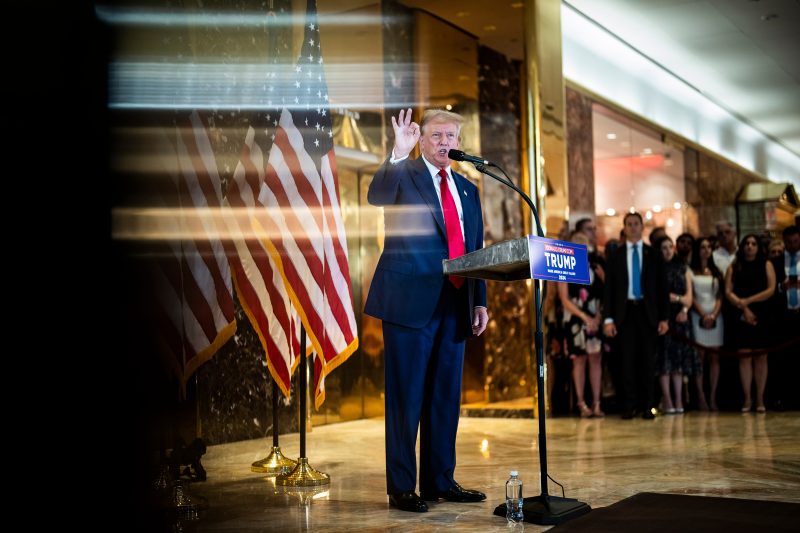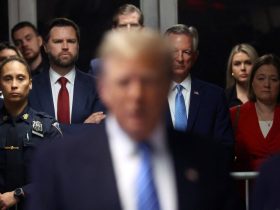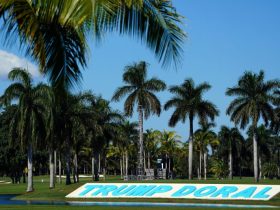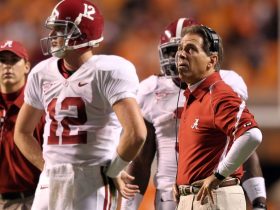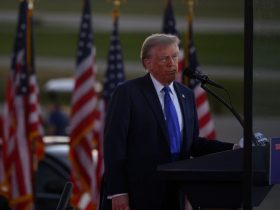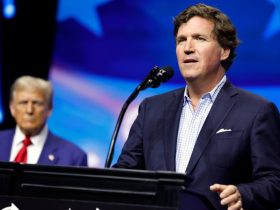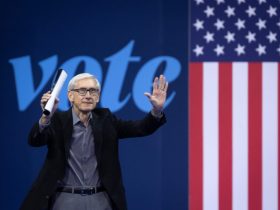Toward the beginning of Donald Trump’s long, meandering Friday morning news conference against his criminal conviction the previous afternoon, he offered a familiar criticism of his unfortunate position.
“It was a rigged trial,” he said, listing off complaints about the circumstances of the charges and the trial and the district attorney. Later in the diatribe, he returned to this idea: “We went up a lot over the last month” — meaning in the polls — “because everybody said it was a rigged deal. It was a rigged trial.”
He didn’t go up in the polls — his national average is almost exactly where it was at the end of April — but that isn’t surprising, given Trump’s predilection for exaggerating his popularity.
On the flip side of that coin, it is also not surprising that he would claim a setback is a function of something being rigged against him. In part, that’s because “failed because it was rigged” is always more appealing to him than “failed because of Trump.” And it’s also because he says everything was rigged, all the time, with a frequency that would make a parrot feel a bit embarrassed at how often it was repeating itself.
Most common, of course, are his assertions that the 2020 presidential election was rigged against him. He often uses this term interchangeably with “stolen,” referring vaguely to some sense that illegal votes were cast or the system was out to get him — or both — or something else happened entirely. The “rigged” descriptor was driven heavily by allies who weren’t willing to jump overboard on Trump’s baseless claims of voter fraud, but for Trump, it’s all the same thing: a way to diminish as unfair something that he wishes hadn’t happened.
Working our way backward, Trump also recently declared that the employment numbers published by the government are “rigged” — an echo of rhetoric deployed before the 2012 election to downplay growth in the economy under Barack Obama. The numbers, for the record, are not rigged.
In March, he declared that the polls were rigged, though he appears to have quickly realized that this was hard to square with his insistence that the polls all showed him winning. (“The polls are all rigged,” he said at a rally. “Of course, lately they have been rigged because I’m winning by so much. I always say it. Disregard that statement.”) But, you know, old habits die-hard, and Trump spent much of the 2016 and 2020 elections waving away polls showing him losing to Hillary Clinton and Joe Biden as unreliable. (Trump lost the popular vote to Clinton and Biden.)
In February, Trump took time during a rally speech to disparage former Wyoming congresswoman Liz Cheney and the House select committee she co-chaired. That committee, tasked with investigating the riot at the Capitol on Jan. 6, 2021, was, in Trump’s estimation, “a rigged deal.”
And the month before that, in a speech during which he referred to things (mostly the election) as rigged 10 times, Trump went broader.
“The whole system is rigged,” he insisted, continuing a riff about how he’d been indicted more times than notorious mobster Al Capone.
Notice that all of this was this year. And it excludes dozens of other examples, of him calling the COMING? election rigged or polls that showed Republican presidential candidate Nikki Haley performing well in the primary or the indictments he faces outside New York. Everything bad that he’s experienced of late? Rigged.
After he left office, he was fairly quiet for a bit, largely not of his own volition. During the 2022 campaign cycle, though, he appeared at several political rallies during which he decried various rigged things like ranked-choice voting in Alaska that benefited his critic Sen. Lisa Murkowski (R) and the media (which is just as rigged here as in Russia, he claimed).
Before he left office, of course, he was very much not quiet. The period between the election and Biden’s inauguration was stuffed with rigged-election complaints, centered on his loss and (during his speech at a rally near the White House that preceded the Jan. 6 attack on the Capitol) the Senate runoff elections won by Democrats in Georgia the day before the Capitol riot.
But before the 2020 election, the smorgasbord of rigged things was much more diverse. The news stories presented on social media sites were rigged, as were search results. So were environmental laws, in favor of non-U.S. countries. The hearings that led to his first impeachment were rigged. An NBC town hall was rigged, as was, once again, the entire system.
One of the things that was most rigged, according to Trump, was the investigation into Russian interference in the 2016 election. It was rigged that he was investigated even though Hillary Clinton was given a “free pass” — despite lengthy congressional and criminal investigations. (At other points he decried the investigation into her as rigged.) The Pulitzer Prizes won by media outlets for covering the probe were an example of the system being rigged against him. The whole thing was a “rigged, phony witch hunt.”
“I call plenty of things in this country rigged,” Trump said in a candid moment in October 2018, “but we’re straightening it out. But it was a rigged system. Plenty of things rigged.” Here he was talking not about himself but … prescription drug prices.
To goad Clinton during the 2016 campaign, Trump regularly claimed that the process by which she won the Democratic nomination was rigged — relying in part on information released by WikiLeaks that was itself linked to the Russian interference effort.
During the third presidential debate that year, Clinton observed Trump’s already established pattern here.
“You know, every time Donald thinks things are not going in his direction, he claims whatever it is, is rigged against him,” she said. She offered some examples, including that “when he didn’t get an Emmy for his TV program three years in a row … he started tweeting that the Emmys were rigged against him.”
Mostly true, though he didn’t explicitly use the word “rigged.”
According to many, and while nominated, I would have won the Emmy many times except for my politics. @PrimetimeEmmys
— Donald J. Trump (@realDonaldTrump) January 14, 2013
Before Clinton was his opponent, other Republicans were. And that meant that the rigging was being done by his party, from its delegate-allocation system to party leaders.
During this period, Trump’s affinity for the term was born. Or, according to Trump, that the term itself was born.
“I think the system is rigged,” he said in an interview with The Washington Post. “And that was the word that I came up that now everyone is using. They picked up many of my wonderful words. You never heard the system is rigged before until I started it.”
(Maybe you did, once or twice.)
But this was the point, the central point Trump has been trying to make for a decade: the system is rigged and it is rigged to the disadvantage of his supporters by way of disadvantaging him. It was so rigged, in fact, that it allowed Clinton to continue to run for president in 2016.
“The system is rigged, she shouldn’t be allowed to run,” Trump said shortly before the election that year. “Hillary is engaged in massive criminal enterprise and coverup. … She is likely to be under investigation for a long time, concluding in a criminal trial, our president.”
If you can imagine such a thing.

